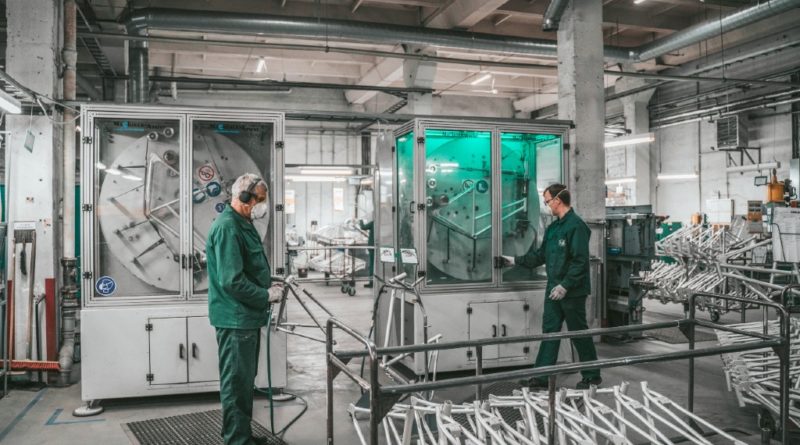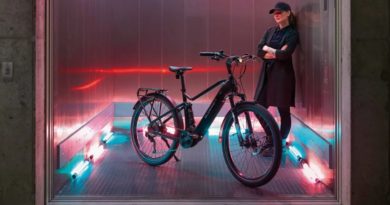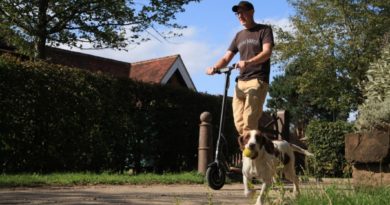500,000 bikes a year and counting: The growing importance of Lithuania’s bicycle industry
‘TIGER ON THE MOVE’: Since gaining independence in 1990, Lithuania has become one of the fastest-growing economies in Europe. A visit to the Baltic country suggests it also could soon play a more important role in the bicycle industry. Werner Müller-Schell reports on the former “Baltic tiger state” for CIN…
The street of the industry. The name on the ageing, slightly rusty sign is one of many indicators that we are in an area with a long industrial past. As early as the 19th Century, the Lithuanian city of Šiauliai had developed into an economic hub. And even today, factory buildings and warehouses line the roadside of the “Pramonės gatvė”, as the road leading through the south of the city is officially called. It is therefore no coincidence that the destination of our journey – a large red building at the end of the industrial road – Is also a testimony to this artisanal history. Bicycles and bicycle components have been manufactured here for 75 years. Today, the factory, on whose façade the words “Baltik Vairas” are emblazoned in large letters, is the largest bicycle producer in the Baltic States.
“We are one of the best-known companies in the region. And also one of the most traditional. For several generations, a significant part of the inhabitants of Šiauliai have had some kind of relationship with the bicycle factory,” says Iain Mackay. The Dutchman has been wpon
orking as a sales manager for the Lithuanian company for seven years. During a tour through the modern-looking production halls, he gives us an intimate look behind the scenes. In the entrance area, several black-and-white photos remind us of the long history of the production plant. The “Šiauliai bicycle factory”, as it was originally called, was once one of the most important bicycle manufacturers in the Soviet Union. After the fall of the Iron Curtain, it eventually evolved into one of Europe’s leading bicycle and eBike producers. “Today, we employ 660 people and can produce up to 500,000 bicycles and eBikes and up to 50,000 cargo bikes per year. We cover the entire production spectrum – from R&D to manufacturing, painting and logistics,” Mackay explains.
On the radar of the bicycle industry
The largest bicycle producer in the Baltic States and one of the leading bicycle factories in Europe, with its comprehensive range of services, Baltik Vairas is a symbol of the recent upswing in the Lithuanian bicycle industry. An industry that for a long time played only a minor role on the international bicycle map, but which could well grow into a permanent fixture in the European two-wheeler scene in the coming years. At Baltik Vairas in Šiauliai, located around three hours west of the capital Vilnius, Mackay and his team already works together with numerous internationally known bicycle and eBike manufacturers. And recently, the Dutch Pon Group also declared its intention to open an own production facility in Kėdainiai next year. Up to 450,000 bicycles and pedelecs will then roll off the production line annually in the city, which is located exactly halfway between Šiauliai and Vilnius. “After reviewing a range of options in Central and Eastern Europe, Lithuania came out best,” said company spokesman Jacques Geijsen when announcing the plans in January 2022. “The country clearly stands out in terms of stability, ease of doing business, as well as a motivated and skilled workforce. Given the recent market developments, the excellent logistics Lithuania can offer also were a deciding factor,” he added.
In fact, Lithuania has become an extremely interesting location for international companies in recent years. Indeed, since regaining its independence from the Soviet Union in 1990, the country has experienced a remarkable upswing, making it one of the most successful economies in the region. This development was further strengthened by the introduction of the Euro as the official national currency in 2015, which attracted more foreign investors and helped to further boost job creation and infrastructure development. With a gross domestic product (GDP) of 28,094 US dollars per capita, the Baltic state is still below the pan-European average, according to the latest data of the International Monetary Fund (IMF). However, it is only ranked slightly behind Spain and ahead of countries such as Greece, Croatia, Portugal or Poland. To put this in perspective: Just eight years ago, Lithuania’s GDP amounted to only half of today’s figures.
“This development is no coincidence. Companies find very good economic conditions to develop here,” explains Ieva Kiškytė. She is the spokeswoman for Invest Lithuania, a Vilnius-based organisation that helps foreign companies gain a foothold in Lithuania. So far, it has assisted more than 400 companies, many of which have opened offices in the country. One example is the German manufacturer Continental, which has been operating a plant in Kaunas, the country’s second-largest city, since 2018. Here, 770 employees manufacture electronic components for Continental’s automotive division. “I would say that Lithuania as a location offers four advantages for companies: A very good business environment with lean processes, a world-leading online infrastructure, a large talent pool of highly educated workers and a central location that makes logistics in Europe fast and efficient,” Kiškytė continues. The latter is one of the great strengths of the Lithuanian economy, she emphasises, and points to the statistics: the logistics sector accounts for a proud 12% of the gross domestic product. The manufacturing industry even accounts for 20%.
A land of makers
Only about 15 minutes from Vilnius, in the Liepkalnis district, there is a bicycle manufacturer that is making these exact advantages its own. The international Timyo Group, which has its roots in both China and the Netherlands, has been operating a factory here for three years, assembling up to 50,000 bicycles and e-bikes a year – both for in-house brands like VanDijck and for OEM partners. “Our frames come from China and are then transported in large parts by rail via Russia to Lithuania. Once the bikes are finished, they are sent to Rosendaal in the Netherlands, from where they are delivered to the customer,” says Dmitry Cherniak, the plant director who was running a bike shop before building up the Timyo factory. Today he is showing us around the large production hall, which is conveniently located in the immediate vicinity of a branch of the logistics company DB Schenker. There are two production lines, 35 employees are busy with transforming naked bicycle frames into ready-to-ride e-bikes. “Logistics is certainly one of Lithuania’s great advantages. But I would also say that it is the people. There are many highly educated and, above all, motivated workers here. If necessary, I could double my team in no time,” Cherniak reports.
Indeed, Lithuania has an extremely attractive labour market with a labour pool of around 1.5 million people. 56% of the young population have a tertiary degree, positioning Lithuania in the EU’s top four. In addition, according to the latest data from Invest Lithuania, 41% of current students are enrolled in mechanical engineering or similar programs. “The manufacturing industry is the backbone of our society,” confirms Elijus Čivilis, CEO of Invest Lithuania. For him, because of these prerequisites, Lithuania is absolutely predestined as a location for the mobility industry and thus also for the bicycle industry. “Another advantage is that we can quickly adapt to new situations and trends. This is shown by numerous statistics in which Lithuania occupies top international positions – for example in digitalisation. In the current economic situation, this adaptability is particularly important. Small countries now have a great opportunity to stir up the market – this also applies to the bicycle industry,” he emphasises.
That this is not an understatement can be seen right outside the doors of the Invest Lithuania branch in the city centre of Vilnius. Although the capital, which has a population of around 550,000 inhabitants, is not as large as other European cities by a long shot, Lithuania’s rapid economic rise over the last few decades is clearly noticeable. High-rise buildings with reflecting glass facades are piling up here, along with several large-scale construction projects. New road surfaces, wide cycle paths and numerous green spaces are also a testimony to the fact that large sums of money have been invested in modernising the infrastructure in recent years. This also applies to the rest of the country beyond the capital: Lithuania has three international airports and a cargo airport, and the ice-free seaport in Klaipėda is the largest of the Baltic countries with an annual cargo volume of 70 million tonnes. In addition, billions have been invested in rail transport and the road network. In the “Global Competitiveness Report” of the World Economic Forum (WEF), this puts it in second place in the field of Central and Eastern European countries. “Lithuania,” says Čivilis, not without reason, “is a country of makers”.
State-of-the-art bicycle production
It is an impression that Iain Mackay can also confirm. The sales manager of Baltik Vairas has already been living here for 17 years and has experienced the impressive change of Lithuania from the former “Baltic tiger state”, as the country was called due to its rapid economic growth around the turn of the millennium, to a flourishing industrial nation at first hand.
“When I came here, the locals didn’t understand why someone from the Netherlands would want to live and work in Lithuania,” he smiles. Today, he says, the situation is different. “People are proud of their country and what they have achieved.” An observation that is also reflected in the population statistics: For a long time, the number of those who emigrated, hoping for better living conditions abroad, was higher than the number of those immigrating. However, this trend has been reversed for a few years now. The average gross salary in the country today is around 1,900 euros per month – and higher in the cities, especially Vilnius.
How advanced Lithuania is in terms of bicycle and eBike production is shown by the tour through the production halls of Baltik Vairas. There are six state-of-the-art production lines, with an electric bike going through 55 assembly steps before it is ready for shipping. The entire journey from the raw frame to the finished eBike takes around 1:20 hours, compared to just 45 minutes for conventional bicycles without electric drivetrains. To support the workers in their activities, there are video screens at each workstation that show the individual working procedures in detail. On a wall not far away, different statistics precisely document the work carried out. “Our long experience is certainly an advantage, because it allows us to work very efficiently. Our partners also appreciate that and befit from it,” Mackay explains. In another hall he proudly presents two new production lines for cargo bikes that have been installed just recently, in order to meet the increasing demand for cargo bikes in European cities. In the future, the company wants to also put a bigger focus on R&D – a field that has become more and more a business pillar,” says the sales manager.
That is Lithuania, too. In many respects, the country has long seen itself not only as a production location, but also as an ambitious development partner. At Baltik Vairas, customers are already accompanied through all areas of the R&D process. Another example of the Lithuanian engineering know-how is the Elinta Group of Companies in Kaunas. With the development of smart electronic components, battery modules and production robots, founder Vytautas Jokuzis has built up here one of Lithuania’s largest high-tech centres. His charging stations for electric cars have already won several international prizes. Recently, the electronics specialist has also become involved in the bicycle industry: under the umbrella of the brand Rubbee, they have developed an electric motor that transforms an ordinary bicycle into an electric bike in less than a minute through a plug-and-play system. The motor and battery are attached to the seat post, and the drive is provided by friction via the rear wheel. “No manufacturer has yet succeeded in firmly establishing a friction-based eBike drive on the market. We intend to do just that,” says Laurynas Jokuzis, CEO at Elinta Motors and Technical Advisor at Rubbee. While presenting the story of Elinta and Rubbee, he also hints at the potential of Lithuania as a high-tech location. According to him, Lithuania is a favourable country for start-ups as well as for investors: “As a relatively small country, Lithuania focuses on the export business. And we have very good conditions for that, because there are numerous grants and subsidies for new and established companies.”
A future bicycle country?
Countries such as Portugal, Italy, Germany and Poland continue to lead Europe in bicycle production by volume. However, a visit to Lithuania – starting with established bicycle manufacturers like Baltik Vairas to innovative start-ups like Rubbee – shows that the former “Baltic tiger” has been making leaps forward in recent years. A momentum that may well accelerate in the coming years, given the high ambitions in the region. Additionally, the investment of the Dutch Pon Group – the largest bicycle manufacturer in the world – In its own production facility in Kėdainiai is likely to have a further pulling effect and attract other players in the bike industry to consider Lithuania as a base for their ambitions on the European market. “Lithuania is increasingly earning its place on the international bicycle map,” notes Iain Mackay at the end of our factory tour at Baltik Vairas, the largest bicycle manufacturer in the Baltics, which has inseparably linked the Lithuanian city of Šiauliai with bicycles already for 75 years. The slightly aged, rusty street sign near the factory hints at it: Here, in the “Pramonės gatvė”, the street of industry, it once began, Lithuania’s long road to becoming a bicycle country.
Words & pictures: Werner Müller-Schell
FOR INVESTORS
To make it easier for foreign investors to start their businesses in Lithuania, the government in Vilnius has launched numerous support programmes. Among other things, seven so-called “Free Economic Zones” (FEZ) have been established, in which no business tax has to be paid for a certain period of time. In addition, a so-called “Green Corridor” has been created to promote large-scale foreign investment projects. This initiative is intended to provide a quicker and easier start for investors with particularly high volumes – regardless of where in the country they want to set up their business. In the “International Tax Competitiveness Index”, an index that evaluates the competitiveness and neutrality of a country’s tax system, Lithuania currently ranks eighth worldwide. Around 3% of Lithuania’s GDP is currently generated by foreign companies that have set up their operations in the country as a result of these incentives. More information about business opportunities in Lithuania can be found on www.investlithuania.com.



